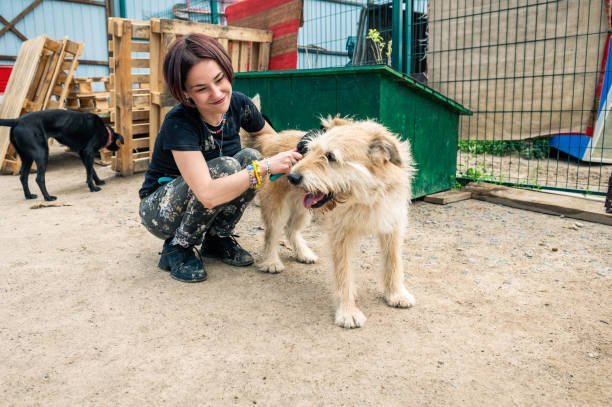What are the key challenges faced by animal rescue volunteers?

Introduction:
In this article, we delve into the vital but often overlooked world of animal rescue volunteers and shed light on the myriad challenges they confront in their selfless mission to protect and care for our furry and feathered companions. These unsung heroes dedicate countless hours of their lives to safeguarding and rehabilitating animals in need, facing a unique set of hurdles that test their resolve and compassion.
From the heart-wrenching scenes of neglected and abused animals to the logistical struggles of limited resources and manpower, the challenges faced by animal rescue volunteers are both emotionally and physically demanding. This article aims to explore these hurdles in detail, offering insights into the multifaceted issues they navigate daily. By understanding the difficulties they encounter, we can better appreciate the incredible dedication and resilience displayed by these volunteers in their unwavering commitment to the welfare of animals.
Emotional Toll and Compassion Fatigue:
Animal rescue volunteers often witness distressing situations, including animal abuse, neglect, and suffering. These emotionally charged experiences can take a toll on their mental well-being. Volunteers form strong bonds with the animals they rescue, making it particularly challenging to cope with loss or witnessing animals in pain. Compassion fatigue, a condition characterized by emotional exhaustion and decreased empathy, is a prevalent challenge. Volunteers may struggle to maintain their emotional resilience, leading to burnout and reduced effectiveness in their roles. To address this challenge, organizations should prioritize providing psychological support and resources to help volunteers manage their emotions and maintain their mental health.
Animal rescue volunteers often bear a heavy emotional burden as they witness the suffering of animals in distress. Constant exposure to heart-wrenching situations, such as neglected, abused, or injured animals, can lead to compassion fatigue. This emotional toll can manifest as stress, anxiety, and even burnout, impacting the mental well-being of volunteers. Coping with the distressing circumstances they encounter requires strong emotional resilience and self-care strategies. Support networks and counseling services are essential to help volunteers navigate these challenges effectively.
Limited Funding and Resources:
Many animal rescue organizations operate on limited budgets and rely heavily on donations and volunteers. Insufficient funding can hinder their ability to provide adequate care, shelter, and medical treatment for rescued animals. Volunteers often have to stretch available resources, resulting in suboptimal conditions for animals and added stress for volunteers. Furthermore, the ongoing costs of running an animal rescue organization, including staff salaries, utilities, and maintenance, can strain financial resources. To address this challenge, volunteers and organizations must focus on fundraising efforts, grant applications, and efficient resource allocation to ensure the best possible care for animals in their custody.
Animal rescue organizations frequently operate on tight budgets, relying heavily on donations and grants. Volunteers face the challenge of working with limited financial resources, which can hinder their ability to provide proper care, shelter, and medical attention to rescued animals. Shortages of essential supplies, like food, bedding, and medical supplies, can compromise the welfare of animals and the effectiveness of rescue efforts. Volunteers often find themselves engaged in fundraising activities and seeking donations to bridge these resource gaps, adding to their workload.
Handling Abused and Neglected Animals:
Rescuing animals that have suffered abuse and neglect poses significant challenges. These animals may be traumatized, fearful, or aggressive, making their rehabilitation a complex task. Volunteers must have the necessary skills and training to handle such cases safely. Additionally, the process of gaining the trust of abused animals can be time-consuming, requiring patience and expertise. Ensuring these animals receive appropriate medical care, behavioral rehabilitation, and socialization is essential but resource-intensive. To address this challenge, organizations should invest in training programs for volunteers, provide specialized facilities, and collaborate with experienced veterinarians and animal behaviorists to ensure the successful rehabilitation of abused and neglected animals.
One of the most distressing challenges faced by animal rescue volunteers is dealing with animals that have suffered abuse or neglect. These animals often exhibit behavioral issues, fear, or aggression due to their traumatic past experiences. Volunteers must possess the necessary training and skills to safely handle and rehabilitate such animals. Building trust and providing a nurturing environment is a time-consuming process that demands patience and expertise. Furthermore, finding suitable forever homes for these animals can be a complex endeavor, requiring careful screening and follow-up to ensure their long-term well-being.
Time and Commitment Demands:
Animal rescue volunteers often find themselves grappling with significant time and commitment demands. The nature of the work, which involves round-the-clock care, emergency responses, and ongoing rehabilitation efforts, can be all-consuming. Volunteers may need to be on-call during odd hours to attend to the needs of rescued animals, disrupting their personal lives and daily routines. This level of dedication can strain relationships, impact employment, and leave little time for leisure or self-care.
Moreover, the commitment extends beyond the immediate rescue phase. Volunteers are responsible for the long-term well-being of the animals they rescue, which may require months or even years of care. This includes feeding, training, and providing medical attention, all of which demand consistent effort. Balancing these demands with personal commitments and work responsibilities can be a significant challenge, and it underscores the resilience and passion required to be an effective animal rescue volunteer.
Regulatory and Legal Challenges:
Animal rescue volunteers must navigate a complex web of regulations and legal requirements that vary by region and jurisdiction. These regulations pertain to the rescue, sheltering, and adoption of animals, as well as the transportation and handling of wildlife, if applicable. Compliance with these rules is crucial to avoid legal issues that can jeopardize the operation of rescue organizations and the welfare of the animals they care for.
Understanding and adhering to these regulations demands significant time and effort. Volunteers must often invest in education and training to stay up-to-date with changing laws and regulations. Additionally, securing permits and licenses, which may be required for housing and caring for certain animals, can be a bureaucratic challenge. Legal issues can also arise in cases of animal cruelty and neglect investigations, requiring volunteers to cooperate with law enforcement agencies and provide evidence to ensure justice is served.
Volunteer Burnout and Support Systems:
Volunteer burnout is a prevalent challenge in the realm of animal rescue. The emotionally taxing nature of the work, combined with the physical demands and long hours, can take a toll on the well-being of volunteers. Burnout can manifest as physical exhaustion, compassion fatigue, and mental health issues such as anxiety and depression. This can lead to high turnover rates among volunteers, undermining the stability of rescue organizations.
To address this challenge, support systems are essential. Effective animal rescue organizations should prioritize the well-being of their volunteers by providing access to counseling services, stress management resources, and opportunities for respite. Peer support and camaraderie among volunteers can also play a vital role in helping individuals cope with the emotional challenges of the work. Recognizing the signs of burnout and taking proactive measures to prevent it are critical for sustaining a dedicated and motivated volunteer base, ultimately ensuring the continued success of animal rescue efforts.
Conclusion:
I hope that this exploration of the key challenges faced by animal rescue volunteers has shed light on the remarkable dedication and resilience required for their vital work. Throughout this article, we’ve delved into the emotional toll and compassion fatigue, the struggle for limited funding and resources, the delicate task of handling abused and neglected animals, the time and commitment demands that reshape their lives, the complexities of regulatory and legal compliance, and the ever-present threat of volunteer burnout.
These challenges underline the profound commitment of animal rescue volunteers who persevere in the face of adversity. Their unwavering compassion and determination drive the noble cause of safeguarding and rehabilitating animals in need. As a society, it is crucial that we recognize and support these volunteers, providing the resources, legal frameworks, and emotional assistance necessary to help them continue their invaluable work. Together, we can create a world where animals receive the care and compassion they rightfully deserve.










Post Comment